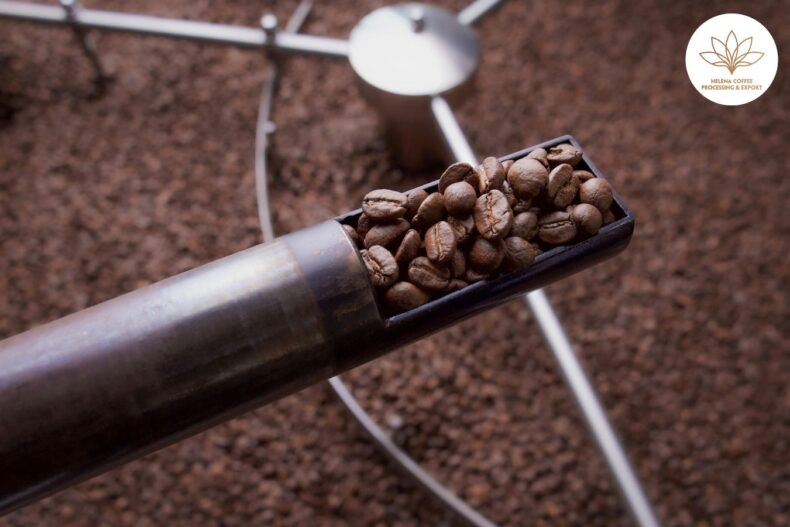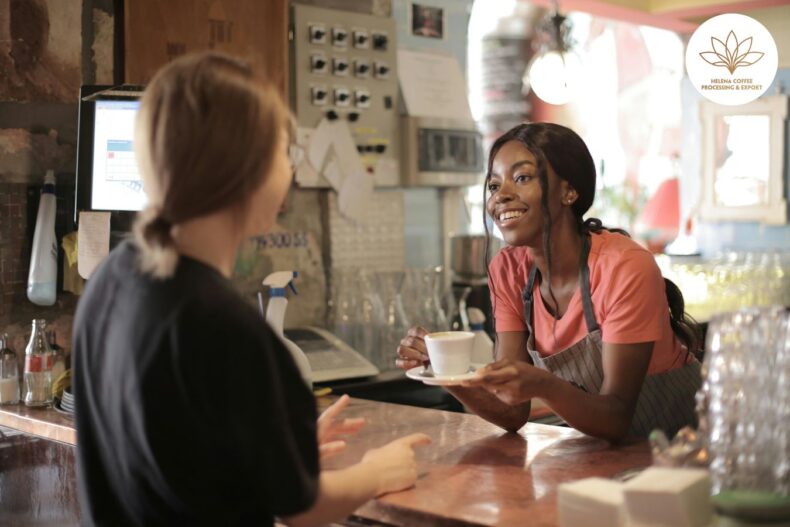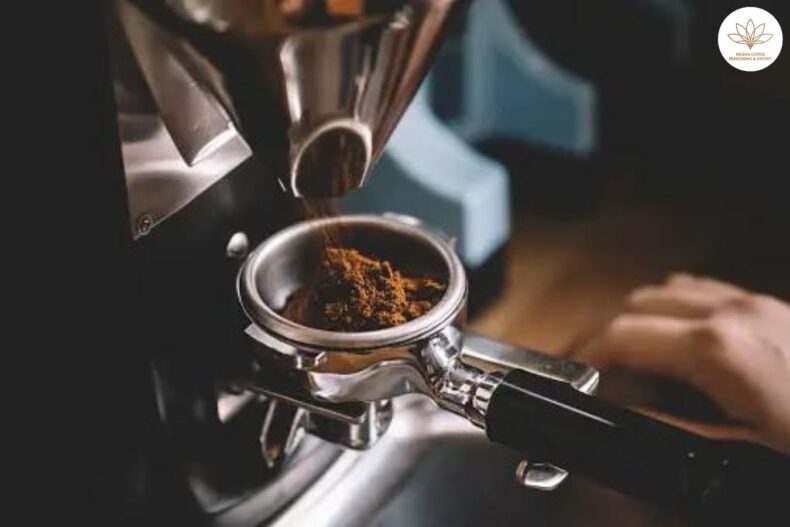
Saudi Arabia, the largest nation in the Middle East and the fifth largest in Asia, is renowned for its deep historical roots and distinctive landscapes. Over recent years, the country has undergone considerable transformations.
The coffee industry in Saudi Arabia is currently experiencing a significant boom, as part of a broader expansion in the Middle East’s market. The government’s substantial investments in coffee cultivation, highlighted by initiatives such as the “2022 Year of Saudi Coffee” campaign, are fostering this growth. Additionally, there’s been a notable surge in domestic coffee consumption.
The rise of specialty coffee across the region has elevated coffee shops to central social and cultural hubs in Saudi Arabian society. These establishments are increasingly significant, especially among the younger population, as the sale and consumption of alcohol are prohibited by law. Thus, third-wave coffee shops are emerging as new venues for socialization.
To gain deeper insights into this evolving landscape, I engaged in conversations with Osamah Alawwam, the co-founder of Roasting House, and Mazen Baset, a business development manager and coffee specialist at Coffee Bean Supplies.
A concise journey through the rich coffee heritage of Saudi Arabia
The establishment of the contemporary Kingdom of Saudi Arabia in 1932 marks a milestone in the nation’s extensive history, which stretches back several centuries.
Arabic coffee, or qahwa, holds a special place in the cultural fabric of Saudi Arabia, as it does across the Arab world. This traditional beverage is a staple in both homes and coffee houses, embodying the rich tradition of coffee consumption in the region.
Qahwa preparation mirrors that of Turkish coffee, utilizing a dallah, a distinctive Arabic coffee pot, for brewing. The coffee is simmered for about 20 minutes before being served in fenjals, petite, handle-less cups, showcasing its unique preparation method.
The ritual of serving qahwa extends beyond everyday consumption, playing a pivotal role in social gatherings throughout the Middle East, from weddings to religious ceremonies. Its profound cultural significance was recognized by UNESCO in 2015, when qahwa was inscribed on the Intangible Cultural World Heritage list.
Beyond its delightful taste, the act of preparing and serving Arabic coffee is a profound gesture of hospitality, cutting across various social strata in many Arab nations, symbolizing unity and shared heritage.
The rise of third wave coffee movement
Specialty coffee emerged in Saudi Arabia more recently than in many other countries, blossoming during a transformative era of social and political shifts.
Between late 2010 and 2011, a wave of anti-government demonstrations swept through several Arab nations, some culminating in unrest and changes in leadership. This era, known as the Arab Spring, also touched Saudi Arabia, though here protests were more contained but still sparked significant reforms, notably in expanding the rights of women. Furthermore, initiatives by the late King Abdullah bin Abdulaziz Al Saud propelled economic growth and reforms.
These changes contributed to the expansion of Saudi Arabia’s middle class, creating a fertile ground for the specialty coffee industry to flourish, evidenced by the increasing number of boutique coffee shops and roasteries.
Elevating standards with premiumization in Saudi Arabia
Mazen, an employee at the green coffee trading company Coffee Bean Supplies in Saudi Arabia, shared insights into the country’s burgeoning specialty coffee scene. A decade ago, the landscape was barren of specialty coffee shops or roasters. Now, it’s a flourishing market with a fervent appetite for premium, distinctive coffees. Saudi roasters are fervently competing to introduce the finest quality coffee to consumers, Mazen observes. This trend, which he terms “premiumisation” involves offering exclusive, rare, and superior quality coffees. The goal is to enhance the brand’s allure and justify higher prices, thereby conveying a higher value to the buyer and encouraging them to spend more.
Simultaneously, there’s a strategic push among roasters to provide quality coffee at reasonable prices to business-to-business (B2B) clients. This strategy aims to make premium coffee accessible at significantly lower prices to the end consumer. According to Mazen, Ethiopian coffee stands out as the most sought-after in the Saudi market due to its perennial popularity.
Osamah, who co-founded Roasting House, one of Saudi Arabia’s pioneer specialty coffee roasters, highlighted the rapid growth of the specialty coffee market in the country. The first specialty coffee shop opened its doors in 2012. Since then, the market has seen explosive growth, with World Coffee Portal data indicating an estimated 3,550 branded coffee shops now operating across the nation. This expansion reflects the dynamic evolution of Saudi Arabia’s coffee culture over the past decade.
Are cafés the new community gathering spots?
In Saudi Arabia, and indeed across much of the Middle East, the emergence of larger coffee chain stores like Starbucks has not only popularized specialty coffee but has also transformed cafes into essential social venues or “third places” where people gather to connect and converse.
This dynamic is especially pronounced in Saudi Arabia, where the prohibition of alcohol pivots the social and nighttime economy towards coffee consumption. As a result, coffee drinking extends well into the night, with cafes in major cities such as Riyadh, Jeddah, and Buraydah increasingly staying open late, and some even operating around the clock. These establishments have become vibrant late-night social hubs, catering to a clientele that seeks social interaction in settings where alcohol is not an option.
The cultural tapestry of the Middle East, with its rich traditions and religious observances like Eid and Ramadan, naturally accommodates late-night gatherings, albeit with coffee rather than alcohol. This shift mirrors broader changes, particularly during religious holidays when nighttime becomes a period of socializing and celebration outside the daylight fasting hours of Ramadan.
Parallel to these shifts, Saudi Arabia is witnessing a gradual decline in gender-segregated coffee shops, alongside a rise in female employment within this sector. This change is reflective of broader societal progress towards gender equality, spurred significantly by the Saudi government’s Vision 2030. This ambitious plan not only aims to bolster female participation in the workforce by creating one million jobs for women but also seeks to enhance educational opportunities and encourage involvement in competitive sports.
Such progressive social policies are fostering a new era of inclusivity, enabling younger generations to socialize more freely in coffee shops. This trend not only marks a significant cultural shift but also highlights the evolving role of cafes as inclusive, communal spaces in Saudi Arabia’s social landscape.
Gazing Towards Tomorrow
The future of the specialty coffee market in Saudi Arabia appears remarkably bright, buoyed by economic growth and forward-looking policies. The country is witnessing a surge in the number of high-end café chains setting up shop, a testament to the evolving tastes and increased spending power of the younger demographics who are making café visits a part of their regular routine.
In a significant move, the renowned Japanese chain % Arabica inaugurated its largest roastery in the kingdom in 2022, underscoring Saudi Arabia’s emerging prominence in the global coffee scene. This trend is complemented by the introduction of other premium coffee shops such as Barn’s, Half Million, Café Kitsuné from France, and EL&N from the UK, among others.
Osamah highlights the burgeoning coffee culture further enriched by numerous annual events and a rising tide of young coffee aficionados participating in competitions. This dynamic environment not only fosters a deeper appreciation for quality coffee but also propels the market towards higher levels of sophistication and premium offerings.
Beyond nurturing a vibrant domestic market, the Saudi government is ambitiously expanding its coffee production capabilities. Mazen shares insights into the government-supported Saudi Coffee Company’s investment of US $320 million to increase annual coffee production from 300 tonnes to an ambitious 2,500 tonnes by 2032. This strategic move not only aims to meet the growing domestic demand but also positions Saudi Arabia as a significant player in the global coffee industry.
For centuries, coffee has been a pivotal element of Saudi Arabian culture. Yet, the emergence of specialty coffee is redefining the Kingdom of Saudi Arabia (KSA) in an extraordinary manner today.
The market for specialty coffee is witnessing an explosive growth, with no indication of deceleration. As coffee shops serve as crucial hubs for social interaction, Saudi Arabia is poised to ascend as a significant force within the international specialty coffee industry.
FAQs:


